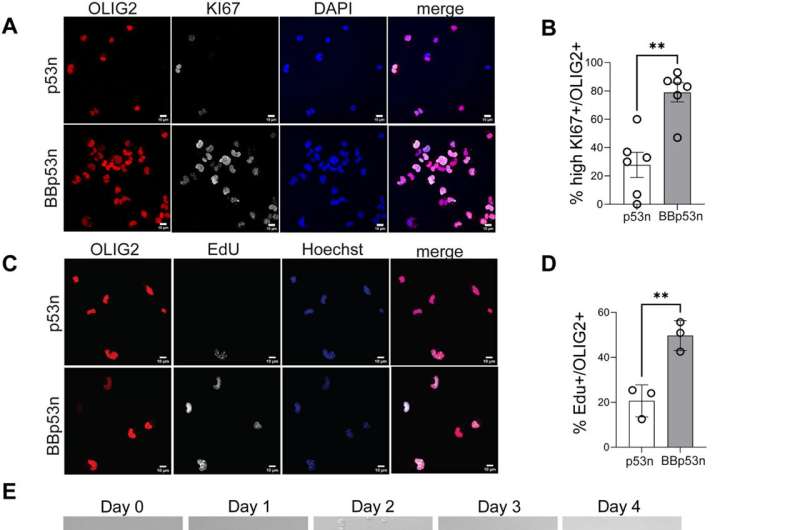
Cultured p53 null OPC over-expressing PDGF-BB are highly proliferative and tend to aggregate in low-adhesion conditions. Credit: Neoplasia (2024). DOI: 10.1016/j.neo.2024.101042
A new study from researchers with the Advanced Science Research Center at the CUNY Graduate Center (CUNY ASRC) sheds light on why certain oligodendrocyte progenitor cells (OPCs) in the adult brain transform into gliomas, the most common and incurable type of adult brain tumors. Previous work identified OPCs—dividing cells in the adult brain that play a crucial role in the brain’s maintenance—as one of the brain cell types that give rise to these tumors.
“OPCs are often described as a double-edged sword, akin to the dual nature of Dr. Jekyll and Mr. Hyde,” said the study’s principal investigator Patrizia Casaccia, founding director of the CUNY ASRC Neuroscience Initiative and Einstein Professor of Biology and Biochemistry at the CUNY Graduate Center.
“On the one hand, these cells can promote myelin repair by differentiating into myelinating oligodendrocytes and serve a number of other interesting functions, including regulating the behavior of neurons and cooperating with several other cell types for proper brain function. On the other hand, they have the potential to transform into gliomas, making them a critical subject of study.”
The research team set out to uncover the molecular mechanisms that cause some OPCs to become tumorigenic. By introducing specific genetic mutations, they discovered that a single mutation in a gene called Trp53, which normally suppresses tumor development, wasn’t enough to induce tumor formation in OPCs. However, when this mutation was combined with the overproduction of a growth factor called platelet-derived growth factor BB (PDGF-BB), the OPCs exhibited growth characteristics strikingly similar to tumor cells.
The study, published in the journal Neoplasia, revealed that only the OPCs with both the Trp53 mutation and PDGF-BB overproduction formed tumors when introduced into the brains of healthy mice, while those with only the Trp53 mutation did not. This finding prompted the researchers to further investigate what was driving this transformation.
“Our additional work identified that the overproduction of PDGF-BB in Trp53 mutant cells alters the growth characteristics of OPCs,” said first author Dennis Huang, a Ph.D. student in the CUNY Graduate Center Biology program working in Casaccia’s lab. “This alteration prevents their normal differentiation into myelin-forming oligodendrocytes by modifying certain histone tags.”
Specifically, in the nuclei of OPCs with both Trp53 mutation and PDGF-BB overexpression, the authors observed higher levels of H3K27me3 and lower levels of H4K20me3 histone tags, compared to cells bearing a single mutation. These results highlight the importance of specific epigenetic changes in driving the transformation of OPCs into gliomas.
They also showed that decreasing the levels of the H3K27me3 histone tag, using pharmacological inhibition, decreased the ability of the OPCs to divide but was not sufficient to stop the process of transformation. Overall, these results suggest that monotherapy with a single inhibitor of H3K27me3 needs to be combined with additional therapeutic strategy in glioma management.
The important discovery suggests that targeting additional histone post-translational modifications could be a promising approach in developing combination therapies for these as yet incurable brain tumors.
More information:
Dennis Huang et al, PDGF-BB overexpression in p53 null oligodendrocyte progenitors increases H3K27me3 and induces transcriptional changes which favor proliferation, Neoplasia (2024). DOI: 10.1016/j.neo.2024.101042
Citation:
New study uncovers key mechanisms responsible for the transformation of adult progenitors into brain tumors (2024, September 3)
retrieved 11 September 2024
from https://medicalxpress.com/news/2024-09-uncovers-key-mechanisms-responsible-adult.html
This document is subject to copyright. Apart from any fair dealing for the purpose of private study or research, no
part may be reproduced without the written permission. The content is provided for information purposes only.
Note: This article have been indexed to our site. We do not claim legitimacy, ownership or copyright of any of the content above. To see the article at original source Click Here













